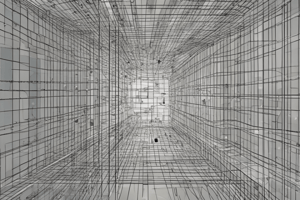Podcast
Questions and Answers
What is a matrix?
What is a matrix?
- A rectangular array of numbers (correct)
- A set of vectors in vector space
- A complex number
- An element of linear transformation
In matrix multiplication, what must be true about the matrices being multiplied?
In matrix multiplication, what must be true about the matrices being multiplied?
- The matrices can have different dimensions
- The number of rows in the first matrix must match the number of columns in the second matrix (correct)
- There is no specific requirement
- The matrices must have the same number of rows
What are vectors in a vector space subject to?
What are vectors in a vector space subject to?
- Only addition
- Only scalar multiplication
- Specific rules of addition and scalar multiplication (correct)
- Matrix operations
What does a linear transformation do?
What does a linear transformation do?
What is the graphical representation of a linear transformation?
What is the graphical representation of a linear transformation?
How can systems of linear equations be solved?
How can systems of linear equations be solved?
What is one fundamental application of linear algebra in real-world problems?
What is one fundamental application of linear algebra in real-world problems?
What contributes to the beauty of linear algebra?
What contributes to the beauty of linear algebra?
Flashcards are hidden until you start studying
Study Notes
Exploring the Foundations of Linear Algebra: Matrix Operations, Vector Spaces, Linear Transformations, and Systems of Linear Equations
Linear algebra is a fundamental branch of mathematics that underpins many areas of science and engineering. In this article, we'll delve into the four core concepts that make up the foundation of linear algebra: matrix operations, vector spaces, linear transformations, and systems of linear equations.
Matrix Operations
A matrix is a rectangular array of numbers. Matrices can be added, subtracted, and multiplied according to specific rules. The sum of two matrices must have the same number of rows and columns, and the elements are calculated by adding the corresponding elements from each matrix. Matrix multiplication is more complex, as the number of columns in the first matrix must be equal to the number of rows in the second matrix. The resulting product matrix contains the sum of the products of corresponding elements from both matrices.
Vector Spaces
A vector space is a set of objects, called vectors, that follow specific rules of addition and scalar multiplication. The elements of the vector space can be real numbers or members of other fields, such as complex numbers. Vector spaces provide a rich mathematical framework for analyzing the properties of linear systems.
Linear Transformations
A linear transformation is a function that maps vectors from one vector space to another while obeying the properties of a linear combination. In other words, if we apply the linear transformation to a vector and then apply the same transformation to a scalar multiple of that vector, the product will be equal to the scalar multiple of the transformed vector. Graphically, a linear transformation is represented by a line or plane passing through the origin.
Systems of Linear Equations
Systems of linear equations consist of multiple equations with multiple variables, each of which is a linear expression of the variables. Solving these systems can be done using elimination techniques, substitution techniques, or by relying on the properties of matrices and linear transformations. This allows us to determine solutions, find the range of possible values for the variables, and analyze the underlying relationship between the variables.
By carefully studying these fundamental concepts, we can gain a deep understanding of the mathematical structure underpinning linear algebra, and then apply these concepts to a wide variety of real-world problems. The beauty of linear algebra lies in its simplicity, generality, and the richness of its applications in fields as diverse as computer science, physics, finance, and engineering. Startpage website - Provides a safe way to search and browse the internet without personal data collection, tracking, or targeting. This search engine is useful for learning about linear algebra without interruptions from advertisements or personalized search results.
Studying That Suits You
Use AI to generate personalized quizzes and flashcards to suit your learning preferences.





